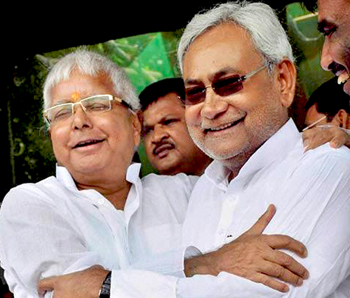New Delhi, Jun 8: Nitish Kumar will be chief ministerial candidate of JD(U)-RJD alliance, Samajwadi Party supremo Mulayam Singh Yadav said on Monday. Confirming the announcement, RJD leader Lalu Prasad Yadav said, "We thought this alliance was the need of the hour and Nitish was the right face to represent it."
 "Both I and Nitish come from the same family, he is the best person to lead this fight against communal forces," he said.
"Both I and Nitish come from the same family, he is the best person to lead this fight against communal forces," he said.
JD(U) leader Sharad Yadav, who was also present at the announcement, said Nitish was a unanimous choice to lead the front in Bihar against the Modi government.
In another development, Bihar CM Nitish Kumar said on Monday that there is "no doubt that Congress will be part of JD(U)-RJD alliance for the upcoming Bihar assembly polls".
Addressing mediapersons in Patna, Nitish Kumar said that "Congress is definitely involved in the talks over the Bihar polls".
"Rahul Gandhi and I discussed various issues in Delhi," the Bihar CM said.
Talking about seat-sharing for state assembly polls, Kumar said that "three members each from RJD and JD(U) will meet tomorrow and have a discussion on seat-distribution". Samajwadi Party leader Ram Gopal Yadav had on Sunday confirmed the alliance between JD(U) and RJD for Bihar assembly polls.
The announcement followed talks between Kumar and Lalu Prasad at Mulayam Singh Yadav's house in New Delhi. "It has been decided that RJD and JD-U will contest the Bihar polls together," the SP general secretary said after the meeting.
Nitish Kumar had earlier in the day met Congress vice-president Rahul Gandhi in a clear indication of his party's desire to tie-up with the party. The Sunday meeting came against the backdrop of some statements from RJD leaders on seat-sharing which appea ..
Elections to Bihar's 243-member assembly are likely to be held September-October.
Six parties of erstwhile Janata parivar had in April decided to merge, but the unification has since not made much progress.





Comments
Add new comment